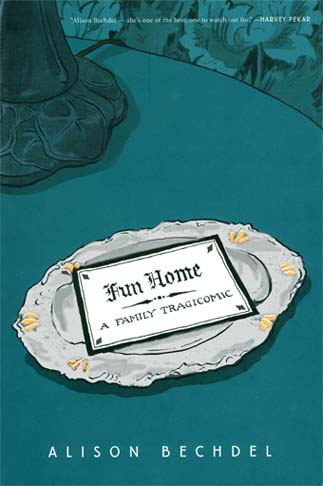The world of comics and graphic novels has taken another great leap forward with
Time's choice of Alison Bechdel's
Fun Home for Best Book of the Year. Presented to the world as a hardcover and published by a blue chip publisher outside the comics industry,
Fun Home finds itself rubbing elbows with the top players of the publishing world and it has paid off big time. In so many ways,
Fun Home holds its own among the coming-of-age classics. It is certainly receiving well-earned accolades.
Bechdel is tuned in to the rhythms of the novel. She immerses the reader in the world of her family: all the dysfunction, eccentricity, and codes unique to that family's secret language. Like any first-rate literary journalism, Bechdel's memoir adopts the novel's story telling techniques such as returning to critical moments in the family history from various vantage points of insight. By the end of the first chapter, all the motifs are in place: we learn that Alison's father, Bruce, is exceedingly distant; is devoted to restoring their Victorian home; is in an unhappy marriage; is a frustrated high school English teacher; is having affairs with teenage boys; and dies in an accident that is also most likely a suicide. Only one last gothic fact has to wait until the next chapter: the family runs a funeral parlor or, as intimates call it, The Fun Home. In between all this, Bechdel comes to terms with her father and embarks on her own journey of self-discovery as a young lesbian.
Drawn in an amiable style, Bechdel provides a perfectly clean and crisp visual to her writing. Despite a patriarch living a tortured existence, the family thrives on creativity not the least of which is a love for books. As Bechdel makes numerous literary references and expresses her search for meaning, her writing elevates higher and higher to the rarefied skies of literary ambition. It is pleasing and appropriate to her work that the art carries along the prose with economical lines and light washes.
If it is possible to successfully draw and write with a touch of the earnest, Bechdel manages to do it. In her case, it actually works. This is the story of a very repressed and erudite family. The stress shows throughout the book. The sad face of Bruce Bechdel is one you won't easily forget.
There are, of course, countless ways to bring to life an extended work in the comics medium. Bechdel has clearly found her path and fully realizes its potential. In a story so indebted to text, as well as memory, Bechdel deftly inserts maps, letters, dictionary entries, her own journal entries, even a police report. Additionally, she quotes extensively from literature, includes numerous book covers, and newspaper headlines. Bechdel was thirteen during the Watergate scandal. So, not only does James Joyce figure into the family narrative but Nixon's downfall too. And the comparisons don't stop there. The entire gay rights movement is hoisted upon Bruce Bechdel's shoulders for a moment as Bechdel considers her father's meaning. If Bechdel's probing veers off towards excessive, she seems to admit as much and navigates back to more level ground. Ultimately, Bechdel rewards the reader for joining her in her search.
